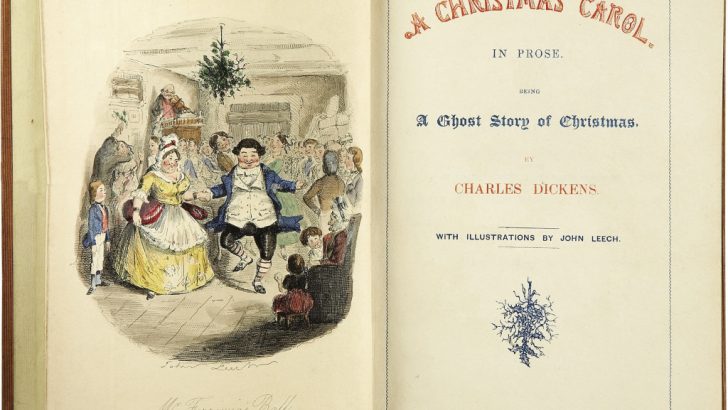The World of Books by the books editor
When I was a child the Christmas season and after was ‘the world of books’; books as gifts to give, books as presents to receive, books to own, to read with the family, books to read in bed at night. Books were an essential part of the joy of Christmas.
In a way Christmas as we know it was the creation, not the Gospels, alas, but Dickens’ A Christmas Carol from 1843, the first of his series of Christmas tales, which being short made it an agreeable read for the family circle at Christmas .
But a century or more later, it was the gifts of Christmas that were special. It was at Christmas that some of the books that gave me most enjoyment, the Arthur Ransome series, Bevis, Biggles and that perennial delight (to me, at least), the long series of William books by Richmal Crompton. A William story of a rainy afternoon in which the Outlaws and Violet Elizabeth Bott spend in the old barn writing a newspaper gave one the feeling that perhaps doing the same sort of thing might well be fun – no hint in William of the hard work of writing of course.
But some of the books received and read at Christmas were books that changed the way one thought about things and the world. Books on Victorian exploration, I now realise, shaped an outlook, and indeed in Mark Twain, in the form of Huckleberry Finn, that contrary Irish imagination, rather than the rather over-smart Tom Sawyer.
Entertainment
Reading aloud in the family circles, especially those long novels typical of the period were a universal entertainment in the 19th Century.
When our boys were small I used to read aloud to them too at Christmas, not A Christmas Carol, but Conan Doyle’s Christmas tale ‘The Adventure of the Blue Carbuncle’. This was one of the first collections of the Holmes stories, and was first published in The Strand Magazine for January 1892, which came out in the last weeks of 1891. But as they grew older, their tastes developed and changed, and I was left, rather like Rumpople of the Baily, re-reading the Holmes stories to myself.
Indeed, one recent Christmas just past, I bought myself with an unexpected fee, for a lecture the two-volume set, edited by Leslie S. Klinger, The New Annotated Sherlock Holmes, a huge thing with all the original illustrations, which I now see costs $95 (about €85). This was a joy to buy, but like all extravagances there was a down side. The volumes which measure 10½ by 2½ inches are far too bulky and heavy to read comfortably in an arm chair or bed.
When I first read the story I thought that a goose would make a great change from turkey, for in our house, with people coming and going, there were often two turkeys in a row, which were still going into the New Year. One year I suggested, inspired by reading about the Blue Carbuncle, that we might try a goose. I did not realise then that geese are at their best around Michaelmas at the end of September. The bird was not a success. But it goes to show, you can’t learn everything from book!
Still you can learn many things, and books of all kinds will have shaped our childhoods and education, our careers, and perhaps our philosophical outlook. That sounds all very serious.
But we also learn that books, the whole world of books, can be great fun. It is also well nigh inexhaustible.
We can buy new books of course, as you see people doing in Hodges Figgis or Dubray or Easons. But better still we can buy old books, not second-hand, no-one uses that term these days. No, such books are ‘pre-loved’.
And in buying them we can go on sharing that love, and in due course pass it on to others. Perhaps as Christmas presents.


 Peter Costello
Peter Costello
